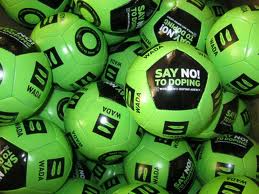By David Owen
August 1 – Further details of alleged shortcomings at the Rio de Janeiro doping control laboratory whose accreditation was revoked last year by the World Anti-Doping Agency (WADA), obliging FIFA to send blood and urine samples from the recent World Cup for analysis in Switzerland, have emerged in minutes of a WADA meeting in South Africa now available on the agency’s website.
The record of a WADA Executive Committee meeting held in Johannesburg last November asserts that three “false positive cases” had been discovered to have occurred prior to the revocation of its accreditation. The assertion, included in a wide-ranging report on topical issues by WADA director general David Howman, notes that all the cases had been in football.
WADA’s revocation of the accreditation of the so-called Ladetec laboratory obliged FIFA to send samples from the 2014 World Cup in Brazil across the Atlantic for analysis in Lausanne at an additional cost of $250,000.
New premises for the laboratory, whose services would ideally be required for the Rio 2016 Olympic and Paralympic Games, have been under construction.
Meanwhile, WADA’s latest annual report shows that the agency remained in deficit in 2013, in spite of a voluntary additional grant of $393,075 from the Russian Government.
After it was first disclosed in March 2013, WADA insisted that the extra Russian payment – financed by a corresponding cut in Russian contributions to the UNESCO Fund for the Elimination of Doping in Sport – should have “no strings attached”. The grant, which is expected to be made each year, brings to $1.1 million the level of the Russian Government’s donation to WADA’s approximately $29 million annual income.
The latest $151,433 “excess of expenses over income” is sharply down on the $770,600 recorded in 2012, but takes to more than $2 million the agency’s cumulative deficit in the past four years.
With cash reserves dwindling and demands on resources as onerous as ever, WADA has taken the unusual – and, it is to be hoped, temporary – measure of asking Executive Committee and Foundation Board members to meet their own costs in attending WADA meetings in 2014.
With a revised World Anti-Doping Code scheduled to take effect on 1 January 2015, however, a degree of relief from the financial squeeze that has been affecting the agency, which is funded broadly 50% by the International Olympic Committee (IOC) and 50% by Governments, does appear to be at hand.
For one thing, it has been benefiting in 2014 from its first budget increase for three years, albeit just 1%.
More significantly, it is set to receive a hefty injection of money to fund new research as a result of an IOC initiative unveiled last December. While the exact amount of this injection is unlikely to become clear before a WADA Foundation Board meeting in Paris in November, it is understood that a figure of up to $12 million may be in prospect, split equally between the IOC and a number of Governments.
Contact the writer of this story at moc.l1745174963labto1745174963ofdlr1745174963owedi1745174963sni@n1745174963ewo.d1745174963ivad1745174963

